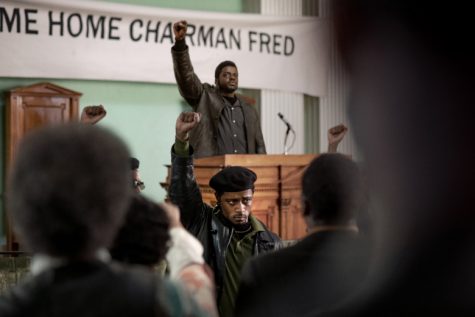Movies everyone should see in their lifetime: The Academy Awards
This 93rd Academy Awards, we seek to illuminate the Best Picture Nominations and establish them as some of the best films of the year. Each day, the reviews for two movies will be published, written by various Homestead students. Today’s featured nominees are Sound of Metal and Judas and the Black Messiah, reviews written by Ana Jaquez Zarate, junior, and Isaac Bloomgarden, sophomore, respectively.
Sound of Metal
Genre: Music/Drama
Rating: R (language, brief nudity)
Rotten Tomatoes Score: 97%
Nominated for: Best Picture, Best Actor (Riz Ahmed), Best Supporting Actor (Paul Raci), Best Original Screenplay, Best Film Editing, Best Sound

A somewhat fast-paced story of passion and loss, Sound of Metal centers around Ruben, a former heroin addict turned heavy metal drummer, who begins to lose his hearing. After she urges him to seek help, Reuben and his girlfriend are forced to part ways, leaving him to adjust to deafness in a community for the hearing impaired.
What I liked:
Sound of Metal’s first act is beautifully composed, completely emerging the viewer into the terrifying journey of hearing loss. The sound design and carefully crafted establishing shots create an anxiety-inducing atmosphere that plunges the audience into the terrifying reality of Ruben–the film’s protagonist. Portrayed by Riz Ahmed, Ruben is a decent protagonist, however, Riz Ahmed’s acting is what makes the movie’s hero stand out. Ahmed’s performance is beautifully captivating, even as the movie drones on for 90 minutes longer than it should. Ahmed depicts Ruben’s anxiety and frustration and allows the audience to empathise and agonize along with Reuben as his hearing diminishes.
What I didn’t like:
Unfortunately much of the film’s best qualities begin to lose traction after the 30 minute mark. After the first act, it seems as though the only possible thing incentivising audiences to keep watching are for Reuben’s eye-catching punk shirts. Although at first glance, the film entices the audience with a seemingly novel premise–the struggles of a soon-to-be-deaf musician. However, the movie shifts its main focus into something much less captivating. Departing completely from the film’s promises of music, the audience’s attention shifts to follow Ruben’s struggle for acceptance of his hearing loss. While charming at times, this film is merely a remake of worn out self-acceptance tropes. Even so, these aspects are not close to being the film’s worst offense. The movie’s wasted potential is truly the film’s one and only sin. Had the movie explored more themes of self-acceptance struggle through music, it would have been much more deserving of its Best Picture nomination.
Conclusion:
While initially captivating, Sound of Metal falls short after the first act to provide audiences with an interesting and immersive story. If not for the COVID-19 pandemic, Sound of Metal would have been buried and shelved amongst other ‘feel good’ movies with themes of perseverance and self-acceptance. While very deserving of sound production award nominations, Sound of Metal is definitely not deserving of a Best Picture nomination. This movie is a definite skip for those who have had their fair share of the much overused ‘self acceptance’ movie tropes.
Who would have guessed that a movie with a Rudimentary Peri shirt cameo would be this disappointing.
This film is available for free with an Amazon Prime subscription.
Judas and the Black Messiah
Genre: Biography/Drama
Rating: R (violence, language)
Rotten Tomatoes Score: 96%
Nominations: Best Picture, Best Supporting Actor (Daniel Kaluuya), Best Supporting Actor (Lakeith Stanfield), Best Song (“Fight for You”), Best Original Screenplay, and Best Cinematography

Judas and the Black Messiah, a very timely film, most would agree, zeros in on the Black Panther movement during the 1960s. The movie is directed by Shaka King and written by King, as well as Will Berson. The story follows Bill O’Neal, a black man in Chicago as he is caught for impersonating a cop to steal a car. He is given an ultimatum by FBI agent Mitchell and J. Edgar Hoover to infiltrate and bring down the Black Panther Party to earn his freedom. Without a choice, he must agree; but as he joins the party, he becomes friends with Party Chairman Fred Hampton and begins to believe in the group’s mission. O’Neal ascends through the ranks of the Black Panther Party while Hampton falls for a fellow revolutionary en route. However, as O’Neal begins to realize what he’s doing, a battle wages through his soul and he must choose between his own freedom and that of his newfound family.
What I liked: First off, the cinematography was amazing, it really captured the 1960s aesthetic without compromising too much on quality or looking cheap. As far as the writing and directing goes, there was one very powerful scene that stuck with me long after watching (minor spoilers ahead). After the death of a fellow Party member, a character engages the police in a shoot-out. In the scene that stuck with me, a police officer is knocked down and for the first time in the movie, you see a police officer at a disadvantage. Instead of cursing out the character and dying a true racist, the officer begs for his life in the most pitiful and sad way I have seen in a long time. However, the character ignores his pleas, choosing to kill him in an act of final revenge before himself being gunned down by police. While some may see this as a disturbing scene, which, in all fairness, it is, it does something very important for this movie that no other scenes do. It finally breaks from the mold of black and white, the thing this movie failed to accomplish many times, and instead shows characters on both sides as real people with real emotions. The police officer doesn’t ramble racial slurs as his final evil parting gift to the planet nor does Jake spare him in an act of benign Disney Movie mercy; rather he finishes the officer off, showing that he, like the officer, is a human who can be pushed past the breaking point as well.
What I didn’t like: The soundtrack, though nominated for an Oscar, is in my opinion nothing out of the ordinary. If anything it’s a bit bland which is a little sad for a movie of this production quality. While parts of the story start off promising, such as the FBI agent beginning to question his conscience, all of this is discarded in order to remain true to its sources. While this does reveal what actually happened, it doesn’t make for a good story; people like to see character development, not just an evil character with no redeeming qualities. On the other hand, some characters, such as Fred Hampton, seem almost “too good”. He is consistently portrayed as a caring and all-benevolent person who only ever once gets angry at a fellow Party member. I feel the story would’ve been a lot more engaging if some of the less satisfactory things he did were shown, as the world isn’t all black and white.
Conclusion: If you haven’t seen the movie and are a big fan of biographical movies about topics that are relevant today, and if you don’t mind a bit of pandering, then go ahead and give Judas and the Black Messiah a watch. If you are looking for an alternative, I feel that Spike Lee’s Do the Right Thing might be a better choice for the subject matter. Ultimately though, Judas and the Black Messiah is likely to take at least some awards due to the timing and subject matter discussed. While I might not like the way some of the ideas are portrayed, this film is critically acclaimed and hating it too much would be pouring salt on a fresh wound so I’d assume it will win at least some form of award. This film is available on YouTube and Amazon Prime for $19.99.

Annie Brown is a senior at Homestead High School. She is passionate about education and community service, serving as a youth ambassador for the Ronald...




